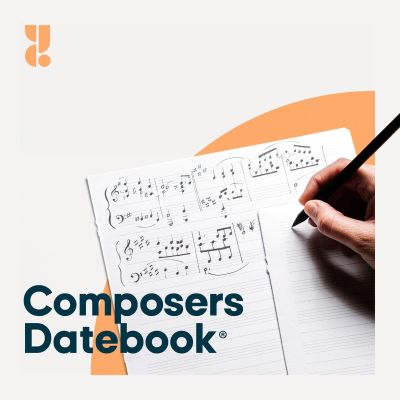Composers Datebook™ is a daily two-minute program designed to inform, engage, and entertain listeners with timely information about composers of the past and present. Each program notes significant or intriguing musical events involving composers of the past and present, with appropriate and accessible music related to each.
Leo Sowerby
Synopsis
Today’s date marks two anniversaries in the life of American composer, teacher, and organist Leo Sowerby, who lived from 1895 to 1968. Sowerby was born on May 1st in Grand Rapids, Michigan, and on his 32nd birthday in 1927, was hired as the permanent organist and choirmaster at St. James’ Church in Chicago, where he remained for the next 35 years.
Sowerby wrote hundreds of pieces of church music for organ and chorus, plus chamber and symphonic works, which are only recently receiving proper attention.
It’s not that Sowerby was neglected during his lifetime–he won many awards, including a Pulitzer Prize in 1946–but many seemed “put off” by both his unabashedly Romantic style and his unprepossessing physical appearance. The younger American composer Ned Rorem, who took theory lessons from Sowerby, puts it this way:
“Leo Sowerby was … of my parents’ generation, a bachelor, reddish-complexioned and milky skinned, chain smoker of Fatima cigarettes, unglamorous and non-mysterious, likable with a perpetual worried frown, overweight and wearing rimless glasses, earthy, practical, interested in others even when they were talentless; a stickler for basic training, Sowerby was the first composer I knew and the last thing a composer was supposed to resemble.”
Music Played in Today's ProgramLeo Sowerby (1895 – 1968) Classic Concerto David Mulbury, organ; Fairfield Orchestra; John Welsh, cond. Naxos 8.559028
On This Day Births1582 - Early Italian opera composer Marco da Gagliano, in Gagliano;
1602 - Baptism of English madrigal composer William Lawes, in Salisbury ; He was the younger brother of the more famous English composer Henry Lawes (1696-1662);
1872 - Swedish violinist and composer Hugo Alfvén in Stockholm;
1895 - American organist and composer Leo Sowerby, in Grand Rapids, Mich.;
1899 - Icelandic composer Jón Leifs, in Sólheimar;
1904 - Czech composer Antonin Dvorák, age 62, in Prague;
1978 - Soviet composer Aram Khachaturian, age 74, in Moscow;
1786 - Mozart: "The Marriage of Figaro" in Vienna at the Old Burgtheater;
1886 - Franck: "Symphonic Variations" for piano and orchestra, in Paris;
1909 - Rachmaninoff: "The Isle of the Dead," in Moscow, conducted by the composer (Julian date: April 18);
1925 - Piston: Three Pieces for flute, clarinet, and bassoon (his first published work), at the École Normale in Paris, by the Blanquart-Coste-Dherin trio;
1939 - Barber: "The Virgin Martyrs," with students from the Curtis Institute of Music on a CBS Radio broadcast, with the composer conducting;
1971 - Dave Brubeck: oratorio "Truth Has Fallen," at the opening of the Center for the Arts in Midland, Mich.;
1987 - Harrison Birtwistle: "Endless Parade" for trumpet, vibraphone and strings, in Zurich (Switzerland) by the Collegium Musicum conducted by Paul Sacher, with trumpeter Hakan Hardenberger;
2002 - Jennifer Higdon: "Blue Cathedral," by the Curtis Institute Symphony conducted by Robert Spano, commissioned to celebrate the 75th anniversary of the Curtis Institute of Music;
2003 - Lukas Foss: Concertino ("Passacaglia, Bachanalia, Passacaglia") for vocal soloists, chorus and orchestra, by the New York Choral Artists and the New York Philharmonic, Kurt Masur conducting;
1761 - Franz Joseph Haydn begins his 30-year tenure as Second-Kapellmeister at Prince Esterhazy's estate in Eisenstadt; In 1766, Haydn succeeded the much older composer Gregor Joseph Werner as First-Kapellmeister;
1825 - first documented American performance of Haydn's Symphony No. 100 ("Military") at Boylston Hall in Boston, at a benefit concert for Haydn's former pupil, Johann Christian Gottlieb Graupner (1767-1836);
1837 - American premiere of Rossini's opera "Semiramide" in New Orleans;
1938 - The German Reichsmusikkammer (Imperial Ministry of Music) forbids Aryan music instructors to teach pupils of Jewish extraction.
